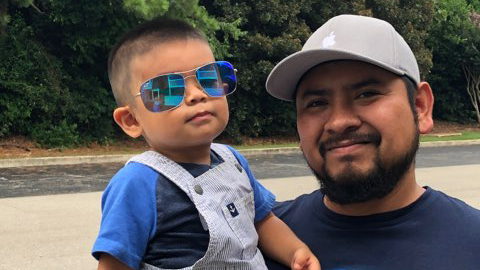Hospitalized For Months: One Man’s Fight Against COVID-19
Since March, more than 22,000 Alabamians have been hospitalized with COVID-19, some requiring months of inpatient care.
Victor Perea, 38, has been fighting the virus for almost three months at UAB Hospital. His wife, Magaly Cordova, said the diagnosis came as a shock. Before this illness, she said Perea didn’t have any pre-existing conditions.
“He was healthy,” Cordova said. “He was a gym guy, you know, eating healthy, go to the gym every day. And really careful about this virus.”
Perea, who lives in Homewood, had recently gotten a new job installing IT systems. He found out he had COVID-19 in early September, after a co-worker tested positive for the virus.

‘He Got Worse And Worse’
Cordova said initially, Perea didn’t have any symptoms.
“The second day, he started with a little bit of coughing and fever,” she said. “But just a little.”
A few days later, Perea developed shortness of breath, started having bad headaches and lost his sense of taste and smell.
They went to an urgent care clinic, but he didn’t improve. A few days later, Perea went to UAB Hospital. Unable to accompany him as a visitor, Cordova waited for an update.
“He called me and he said, ‘Hey I’m going to stay two days.’” she said. “And I was like ‘OK yeah, yeah two days … Great, so you’re going to be better, you know. You’re in the hospital now. They’re going to put you oxygen and all the stuff.’”
Perea stayed much longer than two days. About a week after he was admitted, he was placed on a ventilator and after about a month, one of his lungs collapsed.
Ups And Downs
Cordova said some days it seemed like Perea was getting better and then everything would change.
“They called me one night and they said, ‘Yeah, you know, maybe he’s not going to get through the night. So you can come and say goodbye. He’s really bad right now.’ So I was like, losing my mind,” she said.
Perea was sedated, but Cordova went to see him. She wanted to talk to him.
“I was like, ‘No. I’m going, but I’m going not to say goodbye. I’m going to tell him that he needs to be strong,’” she said.

Victor made it through the night. In the coming days he started to get better.
He is now in UAB’s Pulmonary Intensive Care Unit. He has a tracheostomy to help him breathe and he’s lost a lot of strength. But Cordova is finally seeing real improvement.
“I went to see him and for the first time in two months, three weeks, he say, ‘Hi baby.’ And I was just screaming and crying,” Cordova said.
‘This Virus Is Real’
It’s been nearly three months since Perea was first admitted to the hospital. Cordova doesn’t know how much longer he will be there, but it will likely take a long time for him to recover.
She wants others to understand how bad it can get.
“Some people say like, ‘Oh no it’s not real or it’s just like a flu.’ But it’s not,” Cordova said. “This virus is real. It’s real and it’s killing people.”
It has also been difficult financially for Cordova and Perea, who have two kids. Cordova has continued her job cleaning houses, but Perea has not been able to work for months and he doesn’t have health insurance. While they have not received any medical bills yet, Cordova expects the hospital stay to cost thousands of dollars.
A friend has started a GoFundMe page to help the family.
Why haven’t Kansas and Alabama — among other holdouts — expanded access to Medicaid?
Only 10 states have not joined the federal program that expands Medicaid to people who are still in the "coverage gap" for health care
Once praised, settlement to help sickened BP oil spill workers leaves most with nearly nothing
Thousands of ordinary people who helped clean up after the 2010 BP oil spill in the Gulf of Mexico say they got sick. A court settlement was supposed to help compensate them, but it hasn’t turned out as expected.
Q&A: How harm reduction can help mitigate the opioid crisis
Maia Szalavitz discusses harm reduction's effectiveness against drug addiction, how punitive policies can hurt people who need pain medication and more.
The Gulf States Newsroom is hiring a Community Engagement Producer
The Gulf States Newsroom is seeking a curious, creative and collaborative professional to work with our regional team to build up engaged journalism efforts.
Gambling bills face uncertain future in the Alabama legislature
This year looked to be different for lottery and gambling legislation, which has fallen short for years in the Alabama legislature. But this week, with only a handful of meeting days left, competing House and Senate proposals were sent to a conference committee to work out differences.
Alabama’s racial, ethnic health disparities are ‘more severe’ than other states, report says
Data from the Commonwealth Fund show that the quality of care people receive and their health outcomes worsened because of the COVID-19 pandemic.







